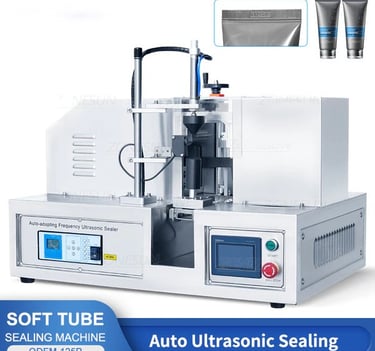Revolutionizing the Manufacturing Process: A Complete Guide to Production Lines and Machinery
LEON MACHINERY
2/7/20256 min read


Introduction: The Backbone of Modern Manufacturing
In today’s fast-paced industrial world, efficient production lines are the lifeblood of businesses. From small-scale operations to large factories, automated and semi-automated production systems are critical in ensuring high productivity, minimal waste, and consistent product quality. Whether you are in the food and beverage industry, pharmaceuticals, or consumer goods manufacturing, understanding the various machines and equipment involved in the production line process is essential.
In this comprehensive guide, we will explore the different types of machines used in production lines, from full automation to semi-automatic systems. We’ll delve into the intricate workings of each piece of machinery, including emulsifiers, filling machines, capping machines, labeling systems, and more. For businesses looking to streamline operations, we’ll also cover key considerations for sourcing these essential machines, particularly focusing on reliable Chinese suppliers, such as Leonwholesale, your go-to China sourcing agent.
Full Auto Production Line: The Power of Automation
A Full Auto Production Line represents the pinnacle of efficiency and speed in manufacturing. These systems are designed to handle high-volume production with minimal human intervention, integrating various machines that work in harmony to create a seamless manufacturing process.
From bottle blowing machines to filling machines, a full automated system allows for continuous production, reducing downtime and labor costs. Automation is particularly beneficial for industries requiring consistency and precision, such as pharmaceuticals, cosmetics, and packaged foods.
One of the primary advantages of a full auto production line is the ability to scale production effortlessly. For instance, liquid, paste, granule, and powder filling systems can be integrated into a single automated production line, catering to various product forms without the need for manual reconfiguration. This adaptability makes full auto production lines highly desirable for businesses focused on long-term growth and efficiency.
Emulsifiers and Mixers: Ensuring Uniform Consistency
In industries such as cosmetics, food, and pharmaceuticals, the ability to mix ingredients uniformly is crucial. Emulsifiers and mixers are designed to blend raw materials into consistent and smooth formulations. These machines can handle a wide range of liquids and powders, combining them efficiently while maintaining the integrity of each ingredient.
Emulsifiers are particularly important in the creation of products like lotions, creams, and food dressings, where maintaining a stable mixture is essential for quality and performance. These machines allow for high-speed mixing, preventing separation and ensuring uniform texture, which is crucial for both consumer satisfaction and compliance with industry standards.
Bottle and Bottle Cap Unscramblers: Organizing for Efficiency
A common challenge in automated production is organizing and feeding containers into the system. Bottle and bottle cap unscramblers play a vital role in streamlining the feeding process. These machines take disorganized bottles or caps and automatically align them for further processing, such as filling, capping, and labeling.
By automating the sorting process, these machines minimize labor costs and reduce the potential for errors that can occur in manual sorting. This leads to smoother operations and more consistent production runs, particularly in industries with high throughput demands.
Conveyor Belts: The Silent Workers of the Factory Floor
No production line is complete without a reliable conveyor belt system. These belts transport materials from one station to the next, ensuring that products are efficiently moved through each stage of the manufacturing process. Conveyor belts are essential for maintaining a steady flow of goods, reducing bottlenecks, and minimizing the time spent handling products manually.
In addition to standard conveyor belts, there are specialized conveyor systems designed for specific industries, such as pharmaceutical conveyors, which adhere to strict cleanliness and safety standards, or food-grade conveyors, which meet hygiene requirements. Whether you need a basic conveyor for light-duty tasks or a heavy-duty system for bulk materials, these machines can be customized to fit your production needs.
Filling Machines: Precise and Versatile
Filling machines are essential for accurately dispensing liquids, pastes, granules, and powders into containers. Whether it’s a liquid filling machine for beverages or a paste filling machine for cosmetics, these machines are designed to handle specific product viscosities and ensure precise measurements.
The versatility of modern filling machines allows them to cater to various product forms. Liquid filling machines often use advanced technologies such as vacuum filling, piston filling, and gravity filling to ensure consistent volume per container. Meanwhile, granule and powder filling systems can handle bulk solids like coffee, spices, or powdered chemicals.
Furthermore, integrated filling and capping systems ensure that containers are not only filled but also securely sealed to prevent leakage, contamination, or spoilage. This seamless integration is a hallmark of automated production lines, improving speed, reducing the likelihood of errors, and ensuring a high-quality end product.
Capping Machines: Securing Your Product
Once bottles or containers are filled, the next step is securing them with caps. Capping machines come in various forms, including automatic cappers, semi-automatic cappers, and manual cappers, each suited to different production speeds and requirements.
Automatic capping machines are ideal for high-volume production, where speed and precision are paramount. These machines are equipped with advanced features such as torque control and cap orientation systems to ensure the correct cap is applied without damage. For smaller or more flexible production runs, semi-automatic capping machines offer a balance of speed and cost-effectiveness, while manual capping systems remain essential for artisanal or low-output production.
Labeling Machines: Professional Presentation
The labeling of products is often one of the final steps in the production process, but it is by no means any less important. Proper labeling ensures that products are identifiable and compliant with regulations. Labeling machines are designed to apply labels to containers quickly and accurately.
There are different types of labeling machines tailored to specific container shapes. Round shape labeling machines are designed for cylindrical products like bottles and cans, while flat surface labeling machines are perfect for items like jars or boxes. Some systems are capable of corner labeling, double-sided labeling, or even glue labeling for more specialized applications.
Investing in high-quality labeling machinery is vital for maintaining a professional appearance and adhering to industry standards. Labels provide key information such as ingredients, instructions, and safety warnings, making them indispensable for consumer safety and satisfaction.
Sealing Machines: Keeping Products Fresh
Sealing machines are crucial in preventing contamination and ensuring the longevity of packaged products. Different types of sealing machines are used depending on the product type and packaging material. These include:
Bag sealing: Common in the food and pharmaceuticals industry.
Blister sealing: Used for medical and consumer products in blister packs.
Bottle sealing: Ensures airtight packaging for liquids and powders.
Can sealing: Common in food and beverage industries.
Vacuum sealing: Often used for perishable goods to extend shelf life.
The versatility of sealing machines means that they can accommodate a wide range of materials, from plastic and aluminum to paper and foil, helping businesses meet packaging requirements across various industries.
Wrapping and Strapping Machines: The Final Touch
Once products are sealed, they often need additional protection during transport or storage. Wrapping machines, shrinking machines, and strapping machines are used to secure products in protective packaging. These systems help ensure that products reach customers in pristine condition.
Shrinking machines use heat to shrink plastic film around products, providing a tight and tamper-evident seal.
Strapping machines apply straps around products to keep them tightly packed and secure during shipping.
Wrapping machines provide a final protective layer, typically used for larger or bulk products.
Each of these machines plays a critical role in ensuring products are packaged securely and can withstand the rigors of transport and handling.
Printing Machines: Customizing Your Products
Printing machines offer a way to add custom markings, such as logos, expiration dates, and batch numbers, to your products. Depending on the requirements, businesses can choose from several types of printing technology, including inkjet printing, laser printing, pad printing, and embossing.
Inkjet printing is commonly used for high-speed and variable data printing.
Laser printing offers precision and durability, making it ideal for permanent markings.
Pad printing is often used for printing on irregular surfaces, such as promotional items.
Embossing machines add a raised design, commonly used for luxury packaging.
By using printing machines, businesses can enhance branding, improve traceability, and ensure product integrity.
Conclusion: Optimizing Your Production Line with the Right Equipment
A successful production line relies on having the right equipment in place to meet the demands of your industry. Whether you are focusing on full automation or a more manual system, choosing the correct machines—like filling machines, capping machines, labeling machines, and sealing machines—is crucial to achieving operational efficiency and high-quality output.
As global supply chains become more interconnected, Leonwholesale, a reliable China sourcing agent, offers businesses the ability to source high-quality production line equipment at competitive prices. Whether you’re looking to upgrade your current systems or set up an entirely new production line, leveraging Chinese manufacturing expertise can help you reduce costs and improve efficiency.
Embrace the future of manufacturing with the right tools, and watch your production line soar to new heights of productivity and quality.


